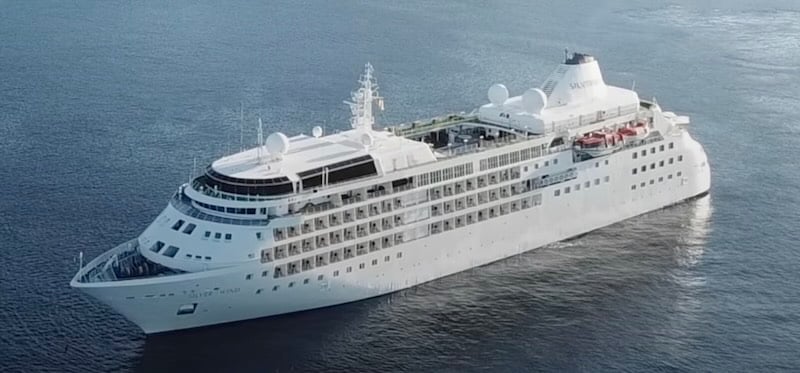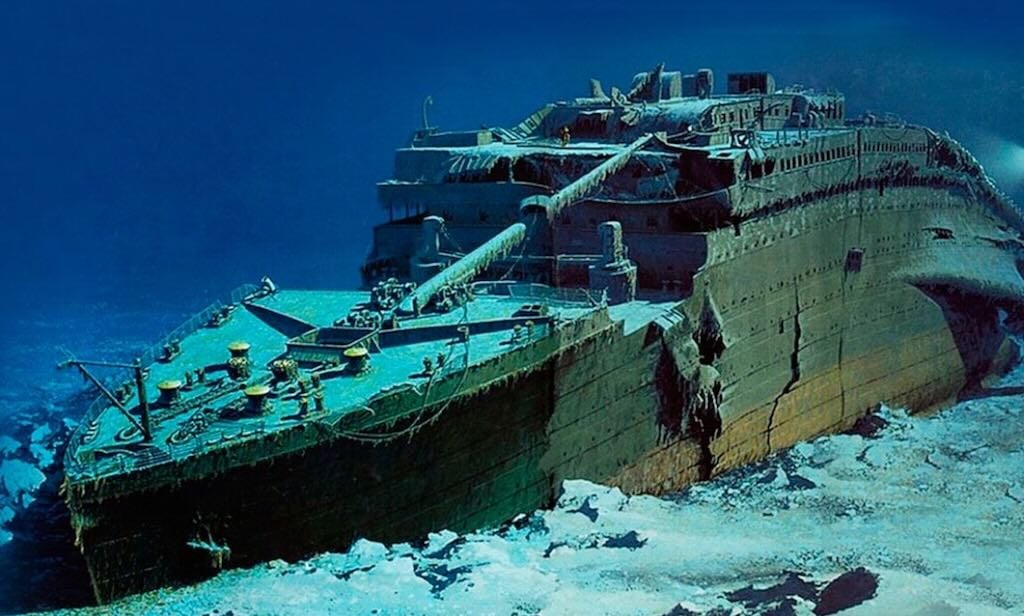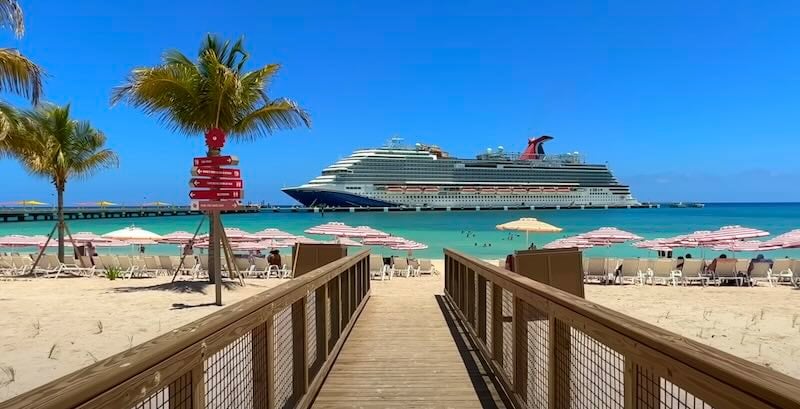When Royal Caribbean announced Icon of the Seas, the cruise world knew it would be big — but few realized just how massive this ship would actually be. This isn’t just another cruise ship. It’s a record-breaking, neighborhood-packed, floating mega-resort that redefines what’s possible at sea.

In this Icon of the Seas size comparison, we’ll break down the real numbers behind the buzz.
- How long is it really?
- How tall is it compared to other ships?
- What makes it bigger than even Wonder of the Seas or Utopia of the Seas?
- And most importantly… does that extra size make your cruise better?
Whether you’re a first-time cruiser, a loyal Royal fan, or just someone curious about the world’s largest cruise ship, this guide is your go-to for understanding what size actually means when it comes to vacation at sea.
Let’s start with the specs that made cruise history.
Table of Contents
How Big Is Icon of the Seas? (Specs at a Glance)
If you’re looking for an Icon of the Seas size comparison that gets straight to the facts, here it is. This ship isn’t just big — it’s a floating marvel of engineering that pushed cruise design to an entirely new level.
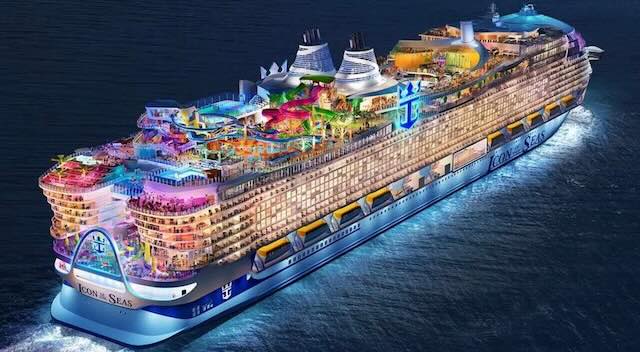
Here are the official size stats that make Icon of the Seas the largest cruise ship in the world:
- Gross Tonnage (GT): 250,800
- Length: 1,198 feet (365 meters)
- Width (Beam): 159 feet
- Height: 20 decks tall
- Total Decks: 20 total, with 18 accessible to guests
- Maximum Guest Capacity: 7,600 passengers
- Double Occupancy Capacity: 5,610 passengers
- Crew Members: 2,350
- Staterooms: 2,805 total
- Bars & Restaurants: Over 40 venues onboard, including 23 completely new concepts
- Pools: 7 unique pools, including Royal Bay — the largest pool at sea
- Waterslides: 6 record-setting slides in the Category 6 waterpark
If you were to stand Icon of the Seas upright, it would be taller than the Eiffel Tower. Let that sink in. And yes — it can take up to 15 minutes to walk from one end of the ship to the other. Bring comfy shoes.
Curious how Icon stacks up against the rest of the fleet? Check out this complete Royal Caribbean ships by size comparison to see where each ship ranks by tonnage, length, and passenger capacity.
This Icon of the Seas size comparison doesn’t just impress on paper. Every inch of space is packed with something to do, see, or explore — from giant theaters and surf simulators to family zones, adults-only hideaways, and tech-powered lounges.
Icon of the Seas vs Wonder of the Seas
When comparing Icon of the Seas to Wonder of the Seas, the differences are subtle but significant. These two ships are the largest cruise ships in the world, both part of Royal Caribbean’s most iconic classes — but Icon marks a bold leap forward.
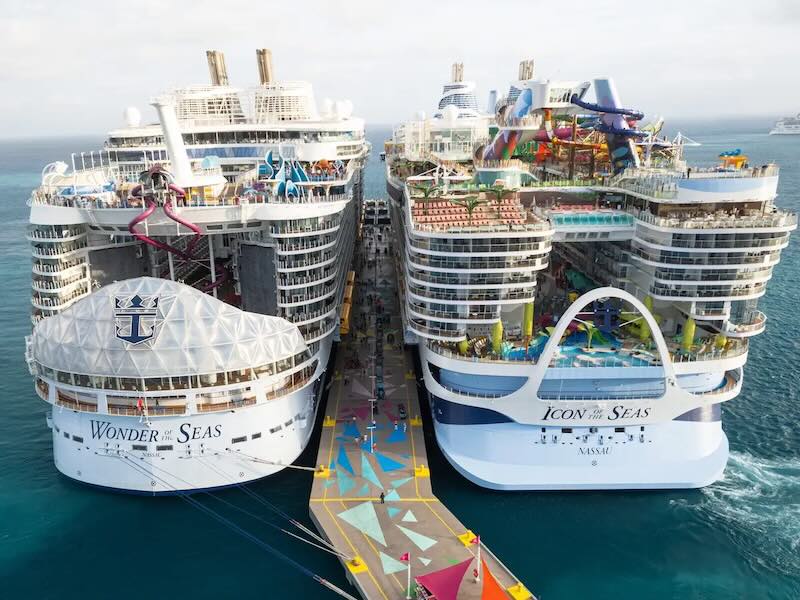
Here’s a quick breakdown of the core size stats side-by-side:
| Feature | Icon of the Seas | Wonder of the Seas |
|---|---|---|
| Gross Tonnage (GT) | 250,800 | 236,857 |
| Length | 1,198 feet | 1,188 feet |
| Width (Beam) | 159 feet | 210 feet (at widest point) |
| Guest Capacity (Max) | Up to 7,600 | Up to 7,084 |
| Decks (Guest Access) | 18 | 18 |
| Year Launched | 2024 | 2022 |
At a glance, Icon of the Seas is just 10 feet longer than Wonder, but it’s the massive jump in gross tonnage that truly makes Icon a game-changer. Gross tonnage measures interior space, and that extra 14,000+ GT translates into bigger venues, more attractions, and totally reimagined neighborhoods.
Icon also introduces entirely new experiences like Surfside, AquaDome, and the Category 6 waterpark, whereas Wonder remains rooted in the classic Oasis-class layout.
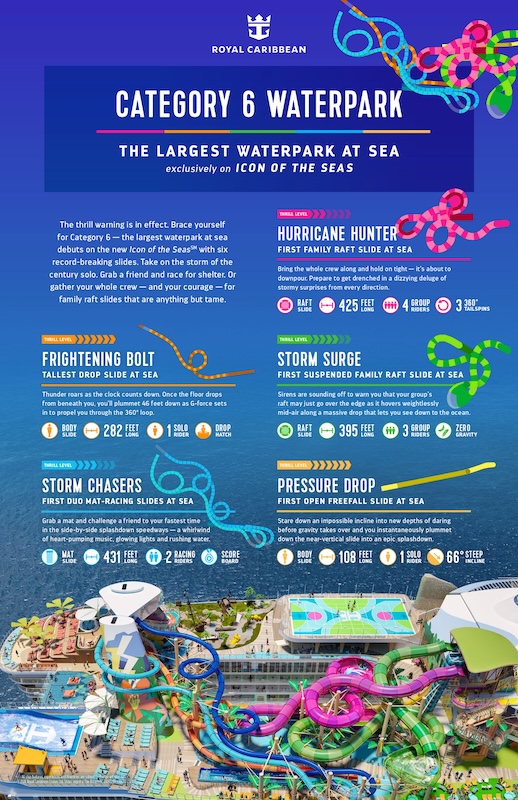
If you’ve sailed on Wonder before, expect something familiar but leveled up. Every public space on Icon is designed with flow, family, and functionality in mind. The ship feels more open, yet more purpose-built for multi-generational travel. This Icon of the Seas size comparison really highlights how Royal Caribbean went from evolutionary to revolutionary in just one ship.
Icon of the Seas vs Utopia of the Seas
At first glance, Utopia of the Seas might look like Icon’s twin, but these two ships are very different beasts. While they both offer over-the-top thrills and a massive footprint, Utopia is actually the final ship in the Oasis Class, while Icon kicks off an entirely new class of cruise ships.
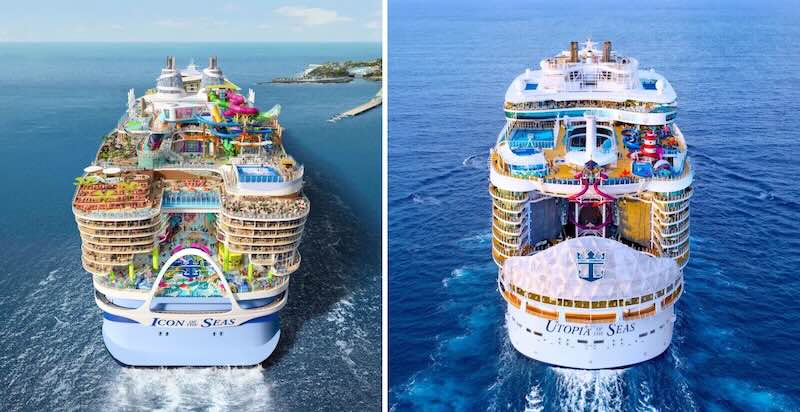
Let’s compare their key specs:
| Feature | Icon of the Seas | Utopia of the Seas |
|---|---|---|
| Gross Tonnage (GT) | 250,800 | 236,860 |
| Length | 1,198 feet | 1,188 feet |
| Max Guest Capacity | 7,600 | 5,668 |
| Decks (Guest Access) | 18 | 18 |
| Launched | 2024 | 2024 |
| Class | Icon Class (1st ship) | Oasis Class (6th ship) |
While Utopia is still jaw-droppingly large and packed with fun — including the Ultimate Abyss slide, AquaTheater, and Perfect Storm waterslides — it doesn’t have Category 6, Surfside, or the futuristic AquaDome.
One huge difference? Icon of the Seas runs on liquefied natural gas (LNG) and features a fully redesigned layout, which makes the ship feel more modern, open, and multi-functional. Utopia still delivers the Oasis-class experience we know and love, but without those signature upgrades that set Icon apart.
So if you’re deciding between the two? Choose Utopia if you want the Oasis experience perfected. But choose Icon if you’re after the next era of cruising — with bigger thrills, bolder design, and more variety than ever before. And if you want a clearer view of how they really stack up, this Icon of the Seas size comparison shows just how far Royal Caribbean has pushed cruise ship design in just a few short years
Icon of the Seas vs Oasis of the Seas
Before there was Icon of the Seas, there was Oasis of the Seas — the ship that redefined cruising in 2009. At the time, it was the largest cruise ship ever built, and it launched an entire era of mega-ships with split decks, open-air neighborhoods, and sky-high thrills.
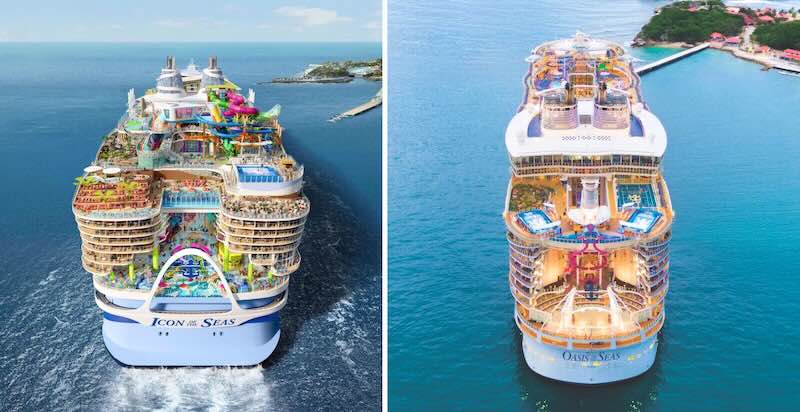
But this Icon of the Seas size comparison shows just how much has changed in the last 15 years.
| Feature | Icon of the Seas | Oasis of the Seas |
|---|---|---|
| Gross Tonnage (GT) | 250,800 GT | 226,838 GT |
| Length | 1,198 feet | 1,187 feet |
| Passenger Capacity | 7,600 max | 6,771 max |
| Crew Members | 2,350 | 2,200 |
| Decks | 20 total, 18 guest | 18 total, 16 guest |
| Year Launched | 2024 | 2009 |
| New Features | AquaDome, Surfside, Category 6 | Central Park, Boardwalk, AquaTheater |
| Fuel Type | LNG (Eco-Friendly) | Traditional Diesel |
Oasis set the tone for modern cruising with its debut of Central Park, the Boardwalk, and the AquaTheater. But now, Icon builds on that legacy with completely reimagined venues like the AquaDome, Surfside Family Neighborhood, and the record-breaking Category 6 waterpark.
One major difference in this Icon of the Seas size comparison is how the ship feels onboard. Icon was designed with flow, functionality, and multi-gen families in mind. It doesn’t just add space — it uses it better.
So while Oasis of the Seas is still a stunning ship that holds up today, Icon is a bold leap forward in cruise design and passenger experience.
Icon of the Seas vs Other Cruise Lines
So how does Royal Caribbean’s newest mega-ship compare to the best from other cruise lines?
This Icon of the Seas size comparison puts things in perspective. While other lines are catching up with bigger ships and bold design, Icon still dominates across the board when it comes to gross tonnage, passenger capacity, and deck count.
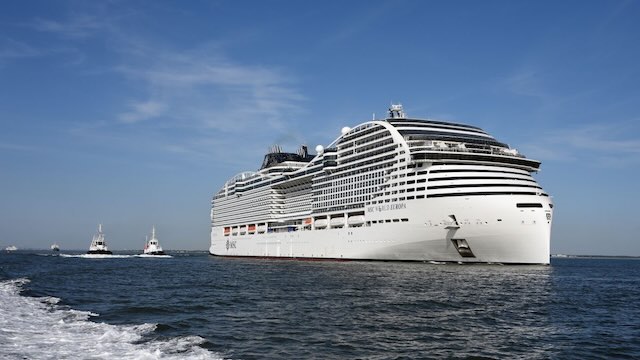
Let’s take a quick look at how Icon of the Seas stacks up against the latest flagships from MSC, Carnival, and Norwegian:
| Ship | Cruise Line | Gross Tonnage (GT) | Length | Max Passengers | Year Launched |
|---|---|---|---|---|---|
| Icon of the Seas | Royal Caribbean | 250,800 GT | 1,198 ft | 7,600 | 2024 |
| MSC World Europa | MSC Cruises | 215,863 GT | 1,094 ft | 6,762 | 2022 |
| Carnival Jubilee | Carnival Cruise Line | 183,521 GT | 1,130 ft | 6,631 | 2023 |
| Norwegian Encore | Norwegian Cruise Line | 169,145 GT | 1,094 ft | 3,998 | 2019 |
Just looking at the numbers, the difference is clear. Icon of the Seas isn’t just a little bigger — it redefines the top end of cruise ship design.
That said, these other ships still offer amazing experiences and innovations of their own. In the next few sections, we’ll break down how Icon compares to each of them individually.
So if you’re cruise shopping and considering other lines, keep reading to see how Icon of the Seas matches up with:
- MSC World Europa
- Carnival Jubilee
- Norwegian Encore
Get ready — this is where the big ship showdown begins.
MSC World Europa
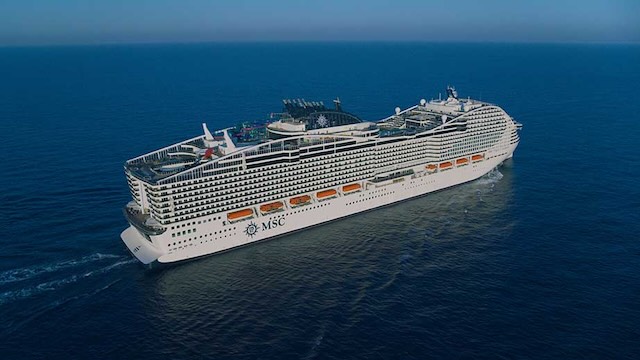
One of the closest competitors in terms of scale, MSC World Europa is massive by industry standards — but still doesn’t quite match up to the Icon of the Seas size comparison. Let’s look at the details:
| Ship | Gross Tonnage (GT) | Length | Max Passengers | Decks | Year Launched |
|---|---|---|---|---|---|
| Icon of the Seas | 250,800 GT | 1,198 ft | 7,600 | 20 | 2024 |
| MSC World Europa | 215,863 GT | 1,094 ft | 6,762 | 22 | 2022 |
Even though MSC World Europa is longer than many ships in the world, Icon of the Seas wins out with over 34,000 more gross tons — that’s a huge difference in interior volume. More GT means more space for waterparks, theaters, and expansive public zones.
Where MSC World Europa shines is in its sleek, futuristic design and European flair. It boasts an open promenade, innovative tech, and eco-friendly touches. But in terms of overall scale, Icon takes the crown.
Carnival Jubilee
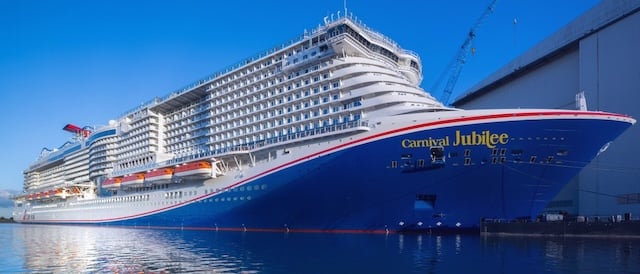
Carnival Jubilee is the newest ship in Carnival’s Excel class, and while it brings bold features like the Bolt roller coaster, it’s still a full size tier below in this Icon of the Seas size comparison.
Here’s how they measure up:
| Ship | Gross Tonnage (GT) | Length | Passenger Capacity (Max) | Decks |
|---|---|---|---|---|
| Icon of the Seas | 250,800+ GT | 1,198 ft | 7,600+ | 20 |
| Carnival Jubilee | 183,521 GT | 1,130 ft | 6,631 | 18 |
Even though Carnival Jubilee packs in plenty of fun — with neon zones, waterslides, and high-energy shows — Icon of the Seas is simply in another league when it comes to size, innovation, and versatility.
The difference in gross tonnage alone is mind-blowing, giving Icon far more room to create multi-generational neighborhoods, diverse dining, and jaw-dropping attractions like Category 6.
If you’re choosing based on ship size and layout? Icon wins by a mile.
Norwegian Encore
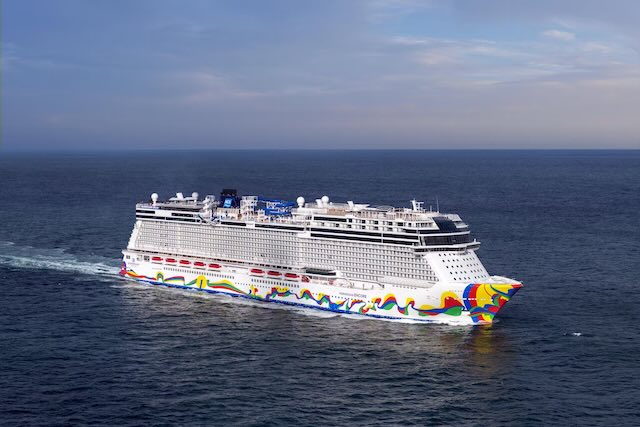
While Norwegian Encore is one of Norwegian Cruise Line’s biggest and most exciting ships, it still falls short in this Icon of the Seas size comparison — by quite a bit.
Check out how these two ships stack up:
| Ship | Gross Tonnage (GT) | Length | Passenger Capacity (Max) | Decks |
|---|---|---|---|---|
| Icon of the Seas | 250,800+ GT | 1,198 ft | 7,600+ | 20 |
| Norwegian Encore | 169,145 GT | 1,094 ft | 4,903 | 20 |
Norwegian Encore offers some wild attractions — like a go-kart racetrack, laser tag, and the Galaxy Pavilion. But when it comes to sheer scale and versatility, Icon of the Seas comes out way ahead.
The difference in gross tonnage is over 80,000 GT, which means more space for innovation, more neighborhoods, and more family-friendly features on Icon.
If you’re comparing these two? Encore is flashy and fun, but Icon is simply built to impress on every level.
Gross Tonnage: Why It Matters (It’s Not Weight!)
If you’re looking at an Icon of the Seas size comparison and thinking, “What the heck is gross tonnage?” — you’re not alone. It sounds like weight, but it’s actually not.
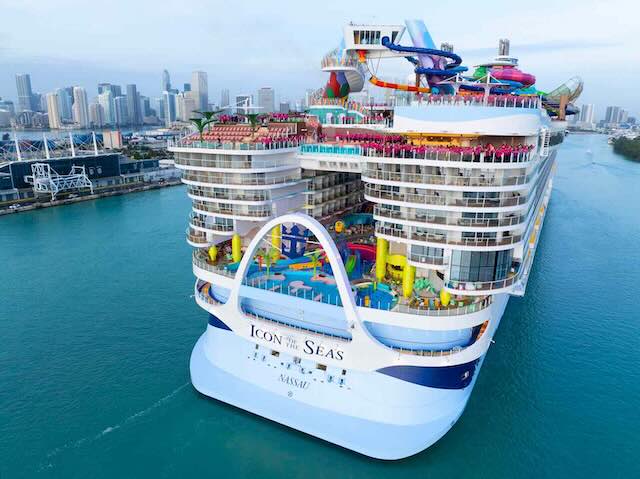
Gross tonnage (GT) is a measurement of a ship’s internal volume, not how much it weighs. Think of it like the cruise ship version of square footage in a house — how much usable space is inside. And when it comes to Icon of the Seas, this number is massive.
Here’s the gross tonnage breakdown for context:
| Ship | Gross Tonnage (GT) |
|---|---|
| Icon of the Seas | 250,800+ |
| Wonder of the Seas | 236,857 |
| Utopia of the Seas | 236,860 |
| MSC World Europa | 215,863 |
| Carnival Jubilee | 183,521 |
| Norwegian Encore | 169,145 |
That extra space on Icon doesn’t just mean bigger theaters or wider hallways. It means:
- Larger and more immersive neighborhoods like Surfside and the AquaDome
- New experiences like Category 6, the largest waterpark at sea
- More open public areas, even with more passengers onboard
So when someone says Icon of the Seas is the biggest cruise ship in the world, gross tonnage is one of the biggest reasons why.
Length, Width & Height Comparison
When we talk about a cruise ship’s “size,” many people picture its length. And while length is important, it’s just one piece of the puzzle. Let’s look at how Icon of the Seas stacks up across length, width, and height compared to other ships.
| Ship | Length (feet) | Width (beam) | Height (decks above water) |
|---|---|---|---|
| Icon of the Seas | 1,198 ft | 159 ft | 20 decks |
| Wonder of the Seas | 1,188 ft | 154 ft | 18 decks |
| MSC World Europa | 1,092 ft | 154 ft | 21 decks |
| Carnival Jubilee | 1,130 ft | 138 ft | 20 decks |
| Norwegian Encore | 1,094 ft | 136 ft | 20 decks |
So yes, Icon of the Seas is the longest ship Royal Caribbean has ever built, but it’s also wider and taller, giving it a seriously commanding presence at sea.
That extra length and beam allow for some of Icon’s most iconic features (pun intended), including:
- A split pool deck design, giving guests more lounging space and less crowding
- More diverse neighborhoods, like the family-focused Surfside and adults-only Hideaway
- The largest waterpark at sea, spread across multiple decks
And because the ship is taller too, those top-deck attractions like Crown’s Edge and Category 6 sit way above the ocean, offering thrill rides with insane views.
If you’re wondering how it stacks up to the competition, the Icon of the Seas size comparison makes it clear — this ship is in a league of its own.
Passenger & Crew Capacity Breakdown
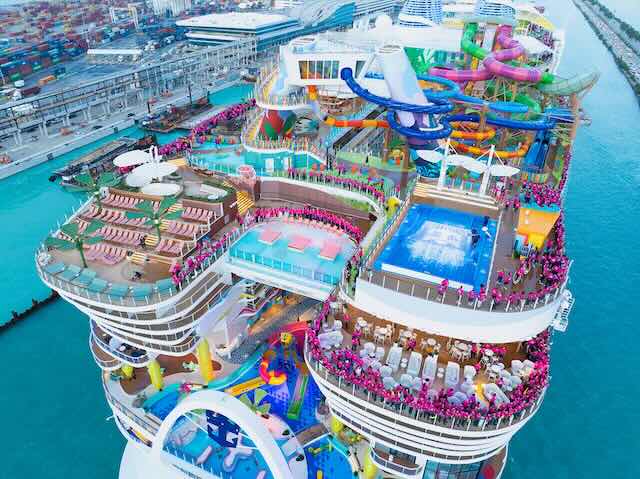
Size isn’t just about the steel — it’s also about the people. A cruise ship’s capacity tells you how many guests it can comfortably handle, and how many crew members are there to serve them. And Icon of the Seas? It’s breaking records again.
| Ship | Passenger Capacity(Double Occupancy) | Max Capacity | Crew Members |
|---|---|---|---|
| Icon of the Seas | 5,610 | 7,600+ | 2,350+ |
| Wonder of the Seas | 5,734 | 6,988 | 2,300 |
| MSC World Europa | 5,252 | 6,762 | 2,138 |
| Carnival Jubilee | 5,282 | 6,631 | 1,735 |
| Norwegian Encore | 3,998 | 4,200 | 1,735 |
At maximum occupancy, Icon of the Seas could host over 7,600 guests. That’s basically a floating small town with splash zones, restaurants, theaters, and a massive crew keeping it all running smoothly.
What stands out is not just the number, but how efficiently that space is used. Thanks to the larger tonnage and reimagined layout, Icon still manages to feel less crowded — especially in public venues and neighborhood hubs.
If you’re thinking about how it compares to other ships, just look at the Icon of the Seas size comparison. More crew per guest also means better service, and Royal Caribbean is leaning hard into creating a resort-style experience at sea, especially for families and luxury cruisers.
Deck Count & Public Space
When you’re talking about cruise ships, deck count isn’t just a number — it’s a hint at how much there is to explore. And Icon of the Seas does not disappoint.

Icon has 20 total decks, with 18 accessible to guests. That’s one more guest deck than Wonder of the Seas, and it shows. You’ll find sprawling neighborhoods like Surfside, entire zones like AquaDome, and multiple pool areas that are all carefully layered to feel open but intimate.
For a little Icon of the Seas size comparison, consider this:
- Deck 15 alone has four distinct pool zones, a massive Windjammer buffet, and FlowRider.
- Deck 16 brings the Hideaway, complete with a suspended infinity pool and DJ sets.
- Deck 17–20 house exclusive areas like the Suite Neighborhood, sun decks, and even the Crown’s Edge thrill ride perched high above the water.
All that vertical space means Royal Caribbean could pack in more experiences without crowding. It’s not just about stacking more stuff — it’s about intentional design. The open-air feel, tiered terraces, and smart crowd flow make a big difference in how the ship feels day to day.
Bottom line? More decks = more space = more fun. And Icon of the Seas uses every inch of that space brilliantly.
Icon-Class Innovation vs Oasis-Class Scale
Royal Caribbean’s Oasis-class ships changed cruising forever when they debuted, packing neighborhoods, massive theaters, and jaw-dropping engineering into one floating city. But Icon of the Seas? It didn’t just add more. It reimagined what a mega-ship could be.
Let’s break down the Icon of the Seas size comparison from an innovation standpoint.
While Oasis-class ships like Oasis, Harmony, and Wonder relied on open-air Central Parks and Boardwalks for their wow factor, Icon of the Seas introduces completely new concepts, like:
- AquaDome: A climate-controlled, glass-enclosed entertainment venue that transforms from tranquil oasis by day to high-tech aqua shows by night.
- Surfside: A dedicated neighborhood just for young families, with its own splash zones, eateries, and suites.
- Category 6 Waterpark: The largest waterpark at sea, stacked vertically and woven into the top decks.
- Crown’s Edge: A hybrid ropes course, zipline, and skywalk that literally dangles riders over the edge of the ship.
While Oasis ships were built to impress, Icon was built to immerse. The spaces feel purpose-driven, whether you’re a couple, a solo cruiser, or a multigenerational family. And even though the ship is bigger, the design choices make it feel more personal.
So when comparing Icon of the Seas to its predecessors, it’s not just a size upgrade. It’s a total mindset shift in how Royal Caribbean is thinking about onboard experience.
Is Icon Really That Much Bigger? Final Thoughts
When you look at raw numbers, the Icon of the Seas size comparison shows a modest jump in dimensions — a few feet longer here, a couple decks higher there. But the real story is in gross tonnage and how that space is actually used.
At 250,800 gross tons, Icon of the Seas isn’t just larger. It’s smarter. The expanded interior volume means more public areas, more cabins with views, and more room for headline attractions like Category 6, Surfside, and AquaDome.
Even compared to mega-ships like Wonder or MSC World Europa, Icon stands apart in how it delivers the experience. The flow feels smoother, crowd control is better, and the layout encourages you to explore every corner of the ship.
So yes, the Icon of the Seas size comparison shows it’s the biggest cruise ship in the world. But it’s also the most ambitious. Whether that makes it better? That’s up to you.
Jim’s Take: Does Bigger = Better for Cruising?
Let me be totally honest with you. I haven’t sailed on Icon of the Seas yet. But based on all the deep-dive research I’ve done — videos, deck plans, passenger reviews, and cruise forums — I’ve got a pretty solid feel for what this ship brings to the table.
The Icon of the Seas size comparison clearly shows she’s the biggest ship out there. But bigger doesn’t always mean better. Some cruisers actually prefer smaller ships that can reach more unique ports, feel less overwhelming, and offer a quieter, more intimate vibe.
That said, everything I’ve seen about Icon Class points to some seriously smart design choices. From the split pool decks to the distinct neighborhoods, Royal Caribbean has worked hard to spread guests out and avoid that jam-packed feeling. And from what cruisers are saying, it actually works.
Now, if you love having endless options — from waterparks and shows to hideaway lounges and family zones — then bigger is probably going to be better for you. But let’s not forget, even Freedom Class ships are huge by most standards. You don’t need to go straight to the top to have an epic cruise.
So does bigger = better? It depends on your style. But no doubt, Icon of the Seas is pushing the boundaries of what’s possible at sea.
Is Icon of the Seas bigger than Wonder of the Seas?
Yes. Icon of the Seas is officially larger than Wonder of the Seas in gross tonnage, length, and passenger capacity. She holds the title for the biggest cruise ship in the world as of 2025.
How long is Icon of the Seas compared to the Titanic?
The Titanic was about 882 feet long. Icon of the Seas stretches to a whopping 1,198 feet — that’s more than 300 feet longer! It’s not even close.
Is Icon of the Seas really that much bigger?
In terms of overall volume and features packed onboard, yes. The Icon of the Seas size comparison shows she outclasses even Oasis-class ships in tonnage, height, and amenities. But remember — bigger doesn’t always feel bigger, thanks to smart ship design.
How many passengers can Icon of the Seas hold?
She can hold 7,600+ guests at max capacity, plus over 2,300 crew members. That’s like an entire town floating on the ocean.
Will Icon of the Seas feel crowded?
Surprisingly, most cruisers say no. Thanks to the redesigned layout, including split pool decks and neighborhood zones, it feels more resort-like than chaotic. Still, peak times (like embarkation day) can feel a little busy.
Can Icon of the Seas visit smaller ports?
Nope. Her massive size limits the ports she can visit. Smaller ships — like Radiance or Vision Class — have better access to less touristy, scenic stops. It’s a trade-off between size and destination variety.
What’s the biggest cruise ship in the world?
As of now, it’s Icon of the Seas. No ship from Royal Caribbean or any other line beats it in gross tonnage or passenger capacity.
What Do You Think About the Icon of the Seas Size?
Have you sailed on Icon of the Seas or one of Royal Caribbean’s other mega-ships? Or do you prefer a smaller, more intimate cruise experience?
Drop your thoughts in the comments below. I’d love to hear what kind of ship you think strikes the perfect balance between size, space, and onboard fun. Let’s chat!

